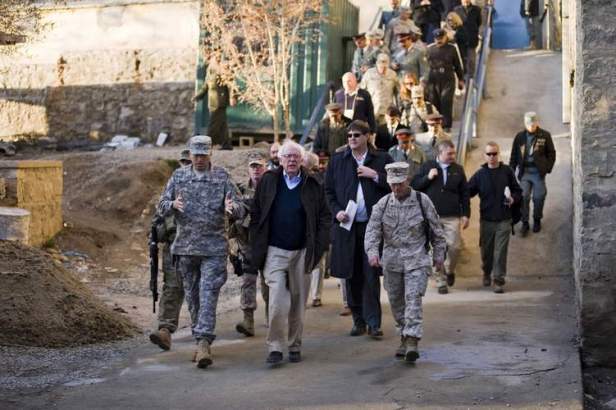
Before voting for H.J.Res. 64 which authorized the use of U.S. military force in response to the September 11 attacks, then-Vermont Congressmen Bernie Sanders waived his speaking rights during debate on the bill and instead submitted the following written remarks for the Congressional record:
Mr. Speaker, as you know, under the authority of the War Powers Act the President already has the legal right to use force when this country is attacked — as was the case on Tuesday when some 5,000 Americans were killed in an unspeakable act of terrorism. So, in an important respect, this debate is more symbolic than legally necessary.
Americans have prayed in churches, synagogues, mosques and other places of worship over the last four days. They have prayed for strength, for courage, for an end to this horror, and for peace. They have heard sermons that spoke of love being stronger than hate, of the forces of good triumphing over evil. I will vote for this resolution because I believe that the use of force is one tool that we have at our disposal to fight against the horror of terrorism and mass murder. One tool but it is not our only tool, and it is something that must be used wisely . . . and with great discretion.I believe that we must work with other nations to root out, capture and eliminate the terrorists who have caused such terrible suffering in our country and elsewhere. But we must also understand that widespread and indiscriminate force could lead to more violence and more anti-Americanism.
Mr. Speaker, the people of the developing world must know that we do not hate them, but only the terrorists who hide in their midsts and control their lives. By word and deed, we must show those people that we are on their side, rather than the terrorists who exploit them. Mr. Speaker, the President has an enormous responsibility. I pray that he uses it well and that Congress provides him with effective guidance.
What emerges about Sanders’ foreign policy from these remarks on the eve of the U.S. invasion of Afghanistan is the following:
- Sanders is not “hawkish” as his ‘left’ opponents misleadingly proclaim, nor does he have a “Troubling History of Supporting US Military Violence Abroad” (a clickbait-y title if there ever was one).
- Sanders is a reluctant warrior although that designation fails to adequately characterize his unorthodox approach to foreign policy questions.
- Sanders correctly pointed out that then-President George W. Bush already had the authority to go to war without new legislation since the restrictions on the executive branch’s use of the U.S. military contained in the 1973 War Powers Resolution (or Act) do not apply when the country has been attacked. The debate on the resolution therefore was more symbolic than substantive and is probably why Sanders decided not to participate in the floor debate but nonetheless inserted his views into the Congressional record in written form.
- Unlike perhaps everyone in Congress, Sanders’ vote for war against the perpetrators of the September 11 attacks and their accomplices contained a strong element of internationalism. He wanted to communicate to people in the developing world “by word and deed” that — unlike Al-Qaeda — the American people “are on their side.”
A future post will explore Sanders’ unorthodox approach to foreign policy, an approach that has long enraged anti-war cliques and befuddled normally insightful journalists.

